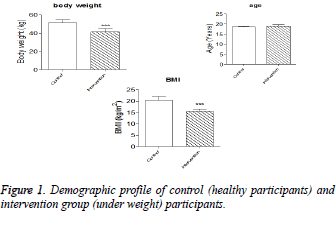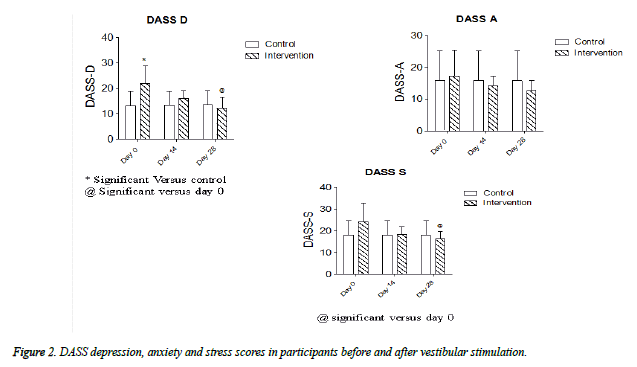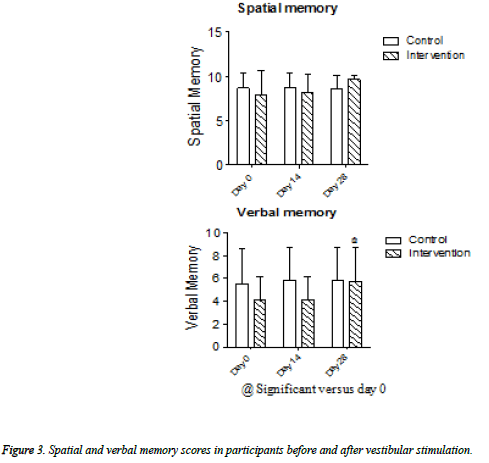ISSN: 0970-938X (Print) | 0976-1683 (Electronic)
Biomedical Research
An International Journal of Medical Sciences
- Biomedical Research (2016) Volume 27, Issue 3
Effect of controlled vestibular stimulation on depression, spatial and verbal memory scores in underweight female students-A pilot study.
1Department of Physiology, Little Flower Institute of Medical Sciences and Research, Angamaly, Kerala, India
2Department of Physiology, Saveetha Medical College, Saveetha University, Thandalam, Chennai, Tamil Nadu, India
3Department of Physiology, Little Flower Medical Research Centre, Angamaly, Kerala, India
- *Corresponding Author:
- JK Mukkadan
Department of Physiology
Little Flower Institute of Medical Sciences and Research
India
Accepted Date: February 16, 2016
The present study was designed to assess effect of controlled vestibular stimulation on stress, spatial and verbal memory scores in underweight female students. 8 cases of underweight participants and 8 age matched healthy (controls) of females were included in the present study by convenient sampling after obtaining voluntary, free, written informed consent. No vestibular stimulation was given for healthy participants (control group) and 28 days of vestibular stimulation was given for (intervention group) underweight participants. Vestibular stimulation was achieved by swinging on a swing, according to their comfort. (Back to front direction) as previously described. DASS scale was used to assess depression, anxiety and stress levels and Spatial and verbal memory test used to assess cognitive functions. Underweight participants are having higher depression, anxiety and stress scores than controls on day o and decreased followed by intervention. Within the underweight participants (intervention group), depression and stress scores was significantly lower on 28th day when compared with day 0. Spatial and verbal memory scores were lower in underweight participants and improved after vestibular stimulation. Within the underweight participants (intervention group), verbal memory scores were significantly improved on 28th day when compared with day 0. In conclusion, this study provides preliminary evidence for the beneficial effect of controlled vestibular stimulation in underweight female students. We recommend further detailed study in this area, to recommend vestibular stimulation for underweight students.
Keywords
Depression, Spatial and verbal memory, Underweight female students, Vestibular stimulation.
Introduction
According to WHO definition, Body mass index (BMI) is a simple index of weight-for-height that is commonly used to classify overweight and obesity in adults. It is defined as a person's weight in kilograms divided by the square of his height in meters (kg/m2) [1,2]. According to the WHO definition, people with BMI greater than or equal to 25 is overweight, BMI greater than or equal to 30 is obesity, BMI less than 18.50 are underweight. College students are becoming over conscious about their body image and following unhealthy eating behaviors, which are closely associated with menstrual abnormalities [3,4]. The prevalence of underweight is comparatively high in female college students, are due to their strong desire for thinness. Underweight females have a misperception of weight, as they perceive themselves as normal and be most satisfied with their weight [5].
Underweight females commonly experience hypotension, bradycardia, edema, dysgeusia, constipation, amenorrhea, insomnia, and loss of clear thinking, good judgment, and concentration, and major laboratory findings include anemia, leucopenia, increased transaminase, decreases in serum albumin, cholesterol, T3, and sex hormones, and decreased bone density [6].
In our recent study we have observed that vestibular stimulation effectively regulates total cholesterol, triglycerides, high density and low density lipoproteins and helps to maintain healthy weight [7].
Most of the symptoms experienced by underweight individuals may be reversed through vestibular stimulation through its extensive network with the structures of the brain [8].
The present study was designed to assess effect of controlled vestibular stimulation on stress, spatial and verbal memory scores in underweight female students.
Materials and Methods
Participants and controls
8 cases of underweight participants and 8 age matched healthy (controls) females were included in the present study by convenient sampling after obtaining voluntary, free, written informed consent.
No vestibular stimulation was given for healthy participants (control group) and 28 days of vestibular stimulation was given for (intervention group) underweight participants.
The following criteria were followed while selecting the participants for intervention group.
The willing individuals with BMI less than 18.50
Age between 18-24 years
Not suffering from any disease or complications
All healthy participants (controls) and underweight participants (intervention) were subjected to general and physical examination.
Data was collected after familiarizing the participants to the testing procedures.
Laboratory setting
The present study was carried out at Department of Physiology, Little Flower Institute of Medical Sciences and Research Centre and Little Flower Medical Research Centre, Angamaly.
Controlled vestibular stimulation
Vestibular stimulation was achieved by swinging on a swing, according to their comfort. (Back to front direction) as previously described [9,10].
Depression, anxiety, stress scale
A previously validated and standardized survey instrument, Depression Anxiety Stress Scale (DASS 42) will be used to assess information on depression, anxiety and stress [11,12].
The DASS is a self-administered, 42-item questionnaire which includes three self-report scales designed to measure the negative emotional states of depression, anxiety and stress. Each of the three scales contains 14 items, divided into subscales of 2-5 items with similar content. Items on the DASS are rated on 4-point Likert - type, ranging from 0 (Did not apply to me at all) to 3 (Applied to me very much, or most of the time).
The higher the scores on each subscale indicate more depression, anxiety and stress. Then the scores were tabulated as per whichever category it belonged to, (which only the investigator knew) namely, (1) Depression Score (D Score), (2) Anxiety score (A Score); Stress score (S Score).
Verbal and spatial memory test
The test material was projected on a screen, allowing 10 seconds for each slide. After the 10 slides were shown, a mathematical problem was projected on the screen.
Immediately after this, the subjects were asked to recall and write down (or in the case of spatial memory, to draw) within 60 seconds the 10 test items which had been shown to them. For both verbal and spatial memory tests, a correct answer was scored as “1” and a wrong answer was scored “0” [13].
Statistical analysis
SPSS 20.0 was used for statistical analysis. Data were analyzed by one-way ANOVA followed by Bonferroni's Multiple Comparison Test.
P-value less than 0.05 was considered significant.
Results
The scores of the above tests were compared between the (intervention) under weight and healthy age matched (controls). Demographic profile of the participants was depicted in figure 1.
As shown in figure 2, underweight participants are having higher depression, anxiety and stress scores than controls on day 0 and decreased followed by intervention. Within the underweight participants (intervention group), depression and stress scores was significantly lower on 28th day when compared with day 0.
As shown in figure 3, Spatial and verbal memory scores were lower in underweight participants and improved after vestibular stimulation. Within the underweight participants (intervention group), verbal memory scores were significantly improved on 28th day when compared with day 0.
Discussion
The prevalence of underweight was much higher than the prevalence of overweight and obesity among female students aged 18-24 years [14]. No data was published relating vestibular stimulation and underweight students. It was reported that stress has a significant role contributing to underweight and overweight status and energy and food item consumption. Earlier researchers recommended a complete stress management program, in which a good diet and exercise program could improve woman’s ability to cope with stress [15]. It was reported that depression levels in underweight girls are higher than in normal weight girls [16]. In our study, we have observed significantly higher (P value<0.05) depression scores in underweight females when compared with healthy females. Followed by vestibular stimulation depression scores were slightly lower than control values. When compared in underweight group alone, depression and stress scores were significantly (P<0.05) decreased after vestibular stimulation. Vestibular stimulation inhibits hypothalamo-pituitary-adrenal axis and sympathetic-adrenal medullary axis and decreases blood pressure, cortisol levels with in normal limits.
It was reported that sensori-motor speed tasks performance of underweight, adolescent anorexia nervosa (AN) participants was poor than controls, but had superior working memory. Cognitive functions were normalized with refeeding and weight gain [17]. Earlier research suggests an association between vestibular function and psychiatric and cognitive symptoms [18]. It was reported that vestibular stimulation improves cognition through modulating hippocampus, HPA axis, neocortex and limbic system [19]. Animal studies reported that vestibular stimulation increases dendritic arborization of the hippocampal pyramidal neurons and decreases acetylcholine esterase levels and improves cognition [20]. In our recent study we have observed significant improvement of cognitive functions followed by hot water vestibular stimulation [21-23]. In the present study, significant improvement in verbal memory scores was observed in intervention group.
Conclusion
In conclusion, this study provides preliminary evidence for the beneficial effect of controlled vestibular stimulation in underweight female students. We recommend further detailed study in this area, to recommend vestibular stimulation for underweight students.
References
- WHO. Physical status: the use and interpretation of anthropometry. Report of a WHO Expert Committee. WHO Technical Report Series 854. Geneva: World Health Organization 1995.
- WHO expert consultation. Appropriate body-mass index for Asian populations and its implications for policy and intervention strategies. The Lancet 2004; 157-163.
- Patil S, Chavan D, Ashokkumar A , Kaur B, Singh S. Body weight/ Image perception and prevalence of Obesity among 2nd year MBBS students- D.Y.Patil Medical College, Kolhapur. IOSR Journal of Dental and Medical Sciences 2014; 13: 6-10.
- Lakkawar NJ, Jayavani RL, Nivedhana AP , Alaganandam P, Vanajakshi N. A Study of Menstrual Disorders in Medical Students and its Correlation with Biological Variables. Sch J App Med Sci 2014; 2: 3165-3175.
- Sirang Z,Bashir HH, Jalil B, Khan SH, Hussain SA, Baig A, Taufeeq M, Samad K, Kadir MM. Weight patterns and perceptions among female university students of Karachi: a cross sectional study. BMC Public Health2013;13: 230
- Kodama H. Problems of Underweight in Young Females and Pregnant Women in Japan. Research and Reviews JMAJ 2010; 53: 285-289.
- Sadanandan NN, Archana R, Sai Sailesh K, Mukkadan JK, Antony NJ. Anti-hyperlipidemic effect of vestibular stimulation in Wistar albino rats. Int J Res Ayurveda Pharm 2015; 6: 509-512.
- Kumar Sai Sailesh, Archana R, Antony NJ, Mukkadan JK. You Are Never Too Old To Swing. Res J Pharm Biol Chem Sci 2014; 5: 612-615.
- Sai Sailesh K,Archana R, Mukkadan JK. Controlled Vestibular Stimulation: A Physiological Method of Stress Relief. J Clin Diagn Res 2014; 8: BM01-BM02.
- Sai Sailesh K, Mukkadan JK. Controlled vestibular stimulation, standardization of a physiological method to release stress in college students. IndianJPhysiolPharmacol 2015; 59: 436.
- Crawford JR, Henry JD. The Depression Anxiety Stress Scales (DASS): Normative data and latent structure in a large nonclinical sample. Br J Clin Psychol 2003; 42: 111-131.
- Lovibond SH, Lovibond PF. Manual for the Depression Anxiety Stress Scales,(2nd. Ed.) (Psychology Foundation, Sydney)1995.
- Manjunath NK, Telles S. Spatial and verbal memory test scores following yoga and fine arts camps for school children. Indian J Physiol Pharmacol 2004; 48: 353-356.
- Pawlińska-Chmara R, Wronka I, Suliga E, Broczek K. Socio-economic factors and prevalence of underweight and overweight among female students in Poland. HOMO- Journal of comparative biology 2007; 58: 309-318.
- Sanlier N, Unusan N. The Relationship Between Body Weight and Stress and Nutritional Status in Turkish Women. Pakistan Journal of Nutrition 2007; 6: 339-344.
- Revah-Levy A, Speranza M, Barry C, Hassler C, Gasquet I, Moro MR, Falissard B. Association between Body Mass Index and depression: the "fat and jolly" hypothesis for adolescents girls. BMC Public Health2011;11: 649
- Hatch A,Madden S,Kohn MR,Clarke S,Touyz S,Gordon E,Williams LM. In first presentation adolescent anorexia nervosa, do cognitive markers of underweight status change with weight gain following a refeeding intervention? Int J Eat Disord2010; 43: 295-306.
- Gurvich C, Maller JJ, Lithgow B, Haghgooie S, Kulkarni J. Vestibular insights into cognition and psychiatry. Brain Research 2013; 1537: 244-259.
- Sai Sailesh K, Archana R, Mukkadan JK. Thinking With Your Sixth Sense. Res J Pharm Biol Chem Sci 2014; 5: 481-485.
- Gopinath A, Archana R , Sai Sailesh K, Mukkadan JK. Effect of caloric vestibular stimulation on memory. Int J Pharm Bio Sci 2015; 6: 453-459.
- Winter L. Vestibular stimulation on a motion- simulator impacts on mood states. Frontiers Psychology 2012; 3: 499-515.
- Sai Sailesh K, Archana R, Mukkadan JK. Impact of traditional vestibular stimulation on depression, anxiety and stress in college students. Biomedical Research 2016; 27: 297-299.
- Devi NP, Mukkadan JK. Impact of rotatory vestibular stimulation and Myristica fragrans on spatial learning and memory in wistar albino rats. Journal of Innovations in Pharmaceuticals and Biological Sciences 2016; 3: 17-32.


